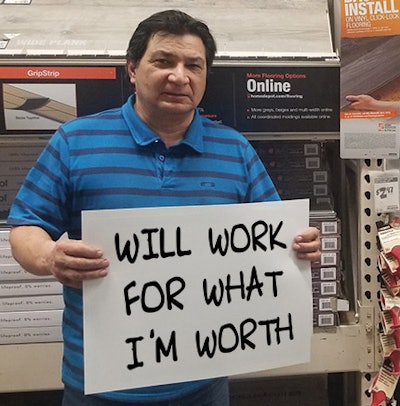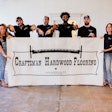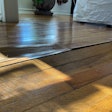
Most times when I lose a bid, I come back to the customer and try to get as many questions answered as I can. This can be tricky, and I use my tact and politeness matched with assertiveness and firmness as much as I can. Sometimes, I don't get anything from the customer.
But sometimes I get some really useful information. I ask questions I can learn from for the next time. Like:
Why did I not get the job?
Who got the job?
Why did they get the job and not me?
Was it price?
Was it that the competitor could start sooner than my team?
Was it because of chemistry between me and the customer?
Was I never going to get the job in the first place, and they just wanted the contractor they had already chosen to be more competitive in his price? (This happens more than we like to admit.)
You can see what I'm getting at. From the answers I get, I can learn and fine-tune my selling to overcome price, availability or what have you.
But … I also like to do this when I win. For example, after I've collected the last paycheck, I ask for a few minutes of the customers' time and ask them why they picked me. Maybe it was price, maybe it was availability, maybe it was because they had gotten estimates from four other contractors and I stood out. Whatever it is, I try to get as much info as possible to know what I need to change and what I need to encourage.
Which leads me to what I really want to communicate: In my immediate geographical area, it appears I have secured the distinction of being one of the most expensive flooring contractors in a 50-mile radius (so I've been told). I really don't want this distinction, and I did not seek it out. It just happened, and I always want to know why.
1. I want to know why I am constantly busy.
2. I want to know why I keep accumulating five-star reviews on Yelp and Google.
3. I want to know why I am warmly received at the first meeting with the customer.
4. I want to know why general contractors won't hire me (as if I care).
5. I want to know why I put start dates on my calendar even before I've given the customer a price quote.
… stuff like that. So I ask the customers.
One job in particular was especially insightful. It was a residential job and turned out to be one of the biggest I had done in years. I was originally asked to provide a refinishing estimate, but the top veneer was too thin, and I told the customer "no" and left. I wrote off the customer and the opportunity because some engineered flooring manufacturers make the top veneer so thin it cannot withstand a refinish by National Wood Flooring Association standards, which are the basis of good work.
Two weeks later, the customer called me back. He said I was the only contractor who walked away, and that he had obtained a few estimates for refinishing since we first met. I brought with me an unused popsicle stick and said, "Look, the sanding process removes about this much wood, and the top veneer of your floor is thinner than that."
He liked my response, and the conversation shifted to a full replacement. To make a long story short, I was asked to perform the work. We had to remove large portions of glued-down wood flooring and large portions of marble. Then we prepped the concrete subfloor for a glue-down engineered flooring installation.
It was a time-consuming job, and three weeks later we were done. On the day of the last payment, I began asking my pre-loaded questions. The responses I received were totally unexpected. Here is what I was told (I actually wrote them down):
I was indeed the highest priced bid he had received. I asked how much of a difference there was between me and second place. The customer said approximately $7,000! The square footage was about 2,000 in total, and that equates to an additional $3.50 per square foot in difference.
I was the only contractor who mentioned the need for a calcium chloride moisture vapor test.
I was the only contractor who furnished the warranty details of not only the wood flooring but also the adhesive manufacturer.
I was the only contractor who listed the manufacturer, product name and number and color of the wood flooring on the quote.
I was the only contractor who listed the manufacturer and product name of the adhesive.
I was also the only contractor who not only mentioned floor prep, but exactly what floor prep would be performed.
I was the only contractor who listed the timeline for the job—the number of days for each phase and the total amount of time for the job.
I was the only contractor who not only gave references but did not get defensive when asked for them.
They also revealed that they had verified my license with the state board, called the flooring supplier and asked about my integrity, called my bonding company, called my general liability company and actually called all the references I gave them.
Adding to this and unknown to me at the time, the customer had read the installation guidelines of the flooring manufacturer and the adhesive manufacturer, and had researched the ASTM 1869-04 report on calcium chloride testing. We also made the lady of the house happy because we left the job each day as clean and as orderly as possible.
This isn't supposed to be a "toot my own horn" story, it's more of a story about how I am very careful and absolutely plan on getting sued on each job. In advance I'll "look for holes" and make sure I do not stumble into predicaments. From the first ring of the phone requesting an estimate to the last moment before I drive away at the end of the job, I'm careful on every step. No way will I neglect the flooring manufacturer's installation guidelines or the adhesive guidelines. There's no cutting corners at all.
My team has not earned the distinction of being high-priced because we charge high prices, heaven forbid! We don't cut a board better than anyone, don't measure better than anyone, don't put a board into the glue better than anyone, don't nail a board to the floor better than anyone. We're just average.
But rather, we follow the guidelines perfectly. Furthermore, the competitors I have prevailed over seem to be afraid to charge for floor prep, or charge to install molding, or charge to take the trash to the dump, or even charge for the calcium chloride test. All these tasks incur a cost, and when added together, they equal the quote. If a customer wants a cheaper price, I merely ask, "What room or rooms do we remove from the quote to make your budget work?"
Never lower the price. Never make a "deal" using the price. If I make a deal, I say, "The deal is: I do the work, and it will be installed or refinished as it is supposed to be."
Also from Angelo DeSanto:
How I Stand Up to GCs to Get Paid Quickly
See all of Angelo DeSanto's popular blog posts and magazine articles here.

































